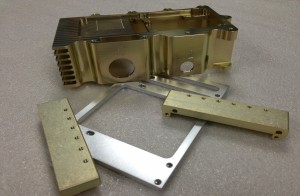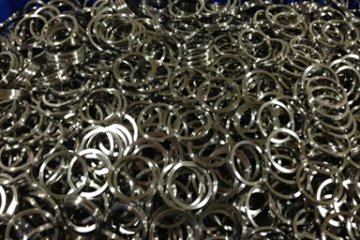Chromate Conversion Coating
Chromate Conversion Coating (also commonly referred to as Chemical Film, Chem Film, Alodine or Iridite) converts the surface properties of the substrate (typically aluminum or magnesium) as compared to plating which applies a coating onto the surface of the substrate. Chromate provides excellent corrosion resistance, is conductive and results in no measurable buildup (0.00001”- 0.00003”) on the parts.
Chromate conversion coatings are the most widely used coating for corrosion protection of Aluminum and Aluminum alloys minimizing surface oxidation. It is commonly used for an undercoat for paint or adhesive applications due to the excellent bonding properties it provides. Class 1A coatings give maximum corrosion protection with the highest electrical surface resistance while class 3 coatings have lower corrosion protection and provide lower electrical surface resistance.
Advanced Surface Technologies applies both standard hexavalent (clear and yellow) and RoHS compliant Trivalent (TCP) to Aluminum and Magnesium alloys.
Both Hexavalent and Trivalent films at Advanced Surface Technologies have passed initial 336 hour salt spray testing and are subject to monthly 168 hour salt spray testing as well as paint adhesion testing conforming to all specifications.
Chromate Conversion Coating Specifications:
- MIL-C-5541E
- MIL-DTL-5541F
- ASTM B 449-93 (2004)
- AMS 2473G
- AMS 2474D
- MIL-DTL-81706B
The Trivalent Chromium Process (TCP) provides a non hexavalent chromate conversion coating compliant with RoHS, ELV and WEEE directives. It compares favorably with the hexavalent coatings providing a conversion coating that fulfills the corrosion, paint and electrical requirements of the different specifications.
Advanced Surface Technologies extensive experience with the chromate conversion coating process enables us to effectively process cast and all the different wrought alloys with alloy specific pre-treatment chemistries.
See also Passivation

